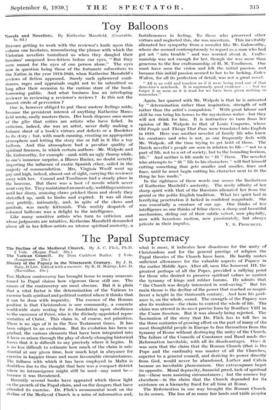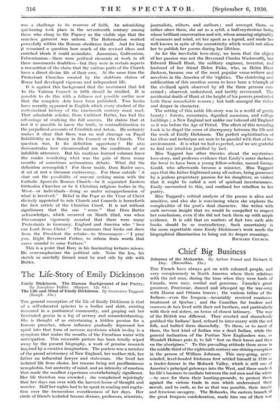The Papal Supremacy
The Decline of the Medieval Church, By A. C. Flick, Ph.D. 2 Vols. (Kegan Paul. 32s.)
History of the Papacy in the Nineteenth Century. By J. B. Bury, D.Litt. Edited with a memoir. By R. H. Murray, Litt. D. (Macmillan. 10s.) Tim Maltese controversy has brought home to many unaccus- tomed to Papal claims how vigorous these still are. The muses of the controversy are most obscure. But it is plain that a vital factor is the determination of the Vatican to exercise both spiritual and political control where it thinks that it can be done with impunity. The essence of the Roman position is that Christendom is one community, a concrete world-wide state resting for its foundation upon obedience to the successor of Peter, who is the divinely-appointed repre- sentative of Christ. This claim is, of course, not primitive. There is no sign of it in the New Testament times. It has been subject to an evolution. But its evolution has been so gradual, the various elements that have been integrated into it have so arisen through the play of slowly-changing historical forces that it is difficult to say precisely where it begins. It is no less difficult to estimate how much of the claim is sub- stantial at any given time, how much kept in abeyance for exercise in happier times and more favourable circumstances. The fullness with which it has been employed in Malta is doubtless due to the thought that here was a compact district where its intransigence might still be used—nay must be—, because it was threatened.
Recently several books have appeared which throw light on the growth of the Papal claim, and on the dangers that have attended its exercise. Dr. Flick's monumental work on the decline of the Medieval Church is a mine of information and, what is more, it indicates how disastrous for the unity of Christendom and for the general prestige of religion the Papal theories of the Church have been. He hardly makes sufficient allowances for the valuable aspects of Papacy in the earlier Middle Ages. After all, men like Innocent Ill, the greatest perhaps of all the Popes, provided a rallying point for those who desired to preserve spiritual values as against the tyranny of kings and robber barons. He admits that "the Church was deeply interested in soul-saving." But his main theme is the decline of the power that reached so magni- ficent a height in the thirteenth century. And here his guid- ance is, on the whole, sound. The strength of the Papacy was also its weakness—the claim to control the whole of life. The claim was uttered in its most precise form by Boniface VIII in the Unam Sanclant. But it was already being rejected. The fascination of the story that Dr. Flick has to tell lies in the three centuries of growing effort on the part of many of the most thoughtful people in Europe to free themselves from the tyranny of Rome without destroying the unity of the Church. The failure of the Councils of Constance and Basel made the Reformation inevitable, with all its disadvantages. One it was seen that the claim that the Roman Church (that is the Pope and the cardinals) was master of all the Churches, superior to a general council, and deriving its power directly from God, would never be abandoned, Luther and Calvin became an inevitable phenomenon. One extravagance begot its opposite. Moral depravity, financial greed, lack of spiritual fire—these were assisting circumstances ; but the essence lay elsewhere—in the claim that the Church depended for its existence on a hierarchy fixed for all time at Rome.
The Reformation in one way brought the Roman Church to its senses. The loss of so many fair lands and virile peoples was a challenge to its reserves of faith. An astonishing quickening took place in the seventeenth century among those who clung to the Papacy as the visible sign that the seamless garment was untorn. The Reformation worked powerfully within the Roman obedience itself. And for long it remained a question how much of the revived ideas and enriched ideals it could assimilate. Jansenism, Gallicanism, Febronianism—there were political elements at work in all these movements doubtless—but they were in certain aspects a reassertion of the claim that the various parts of the Church have a direct divine life of their own. At the same time the Protestant Churches created by the stubborn claims of Rome had developed vigorous and independent life.
It is against this background that the movement that led to the Vatican Council in 1870 should be studied. It is possible to do this with a fullness not possible earlier now that the complete Ada have been published. Two books have recently appeared in English which every student of the ecclesiastical history of the nineteenth century must read. That admirable scholar, Dom Cuthbert Butler, has had the advantage of studying the full sources. He claims that at last it is possible to know the truth, in contradistinction to the prejudiced accounts of Friedrich and Acton. He certainly makes it clear that there was no real cleavage on Papal Infallibility as a theory in the Council or the Church. The question was, Is its definition opportune ? He also demonstrates how circumscribed are the conditions of an infallible utterance. But his cautious learned volumes leave the reader wondering what was the gain of these many months of sometimes acrimonious debate. What did the definition accomplish For those inside, Dom Butler says, it set at rest a tiresome controversy. For those outside "it shut out the possibility of anyone seeking union with the Catholic Apostolic Roman Church—be it separated Eastern Orthodox Churches or be it Christian religious bodies in the West—or individuals—doing so under misapprehension of what is involved." Belief in the Pope as the Vicar of Christ divinely appointed to rule Church and Councils is henceforth the first article of the Christian Creed. It is not without significance that the one " scene " that Dorn Butler acknowledges, which occurred on March 22nd, was when Strossmayer vigorously asserted that there were many Protestants in Germany, England and America who "love our Lord Jesus Christ." The murmurs that broke out drew from the President the rebuke—to Strossmayer—" I pray you, Right Reverend Father, to refrain from words that cause scandal to some Fathers."
This is a point that Bury in his fascinating lectures misses. He over-emphasizes the political side. None the less, his sketch so carefully limned must be read side by side with Butler.































 Previous page
Previous page